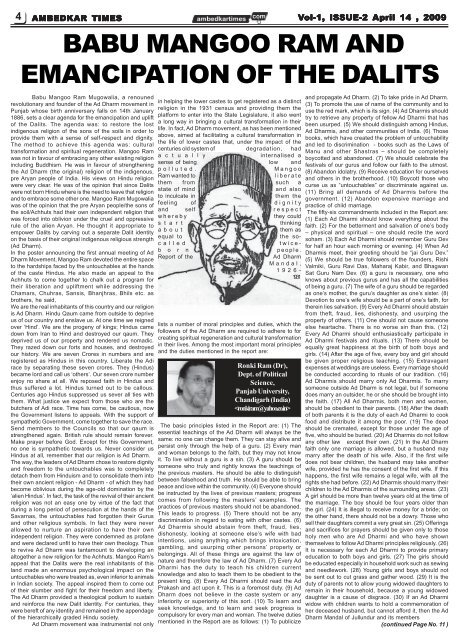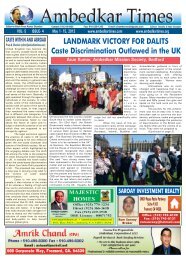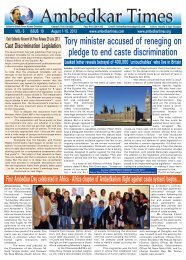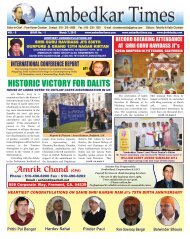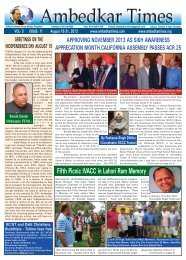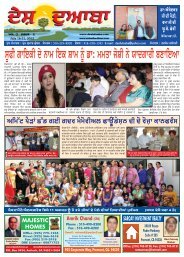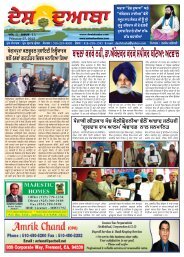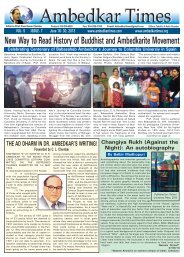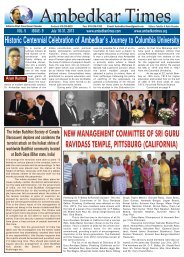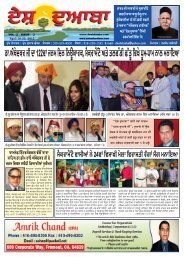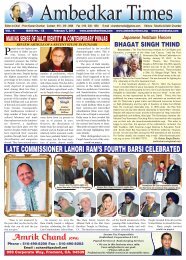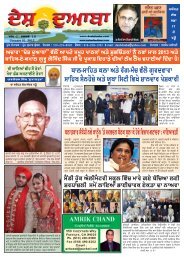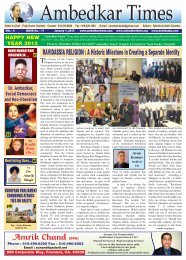ambedkar times news paper april 14, 2009 - Ambedkartimes.com
ambedkar times news paper april 14, 2009 - Ambedkartimes.com
ambedkar times news paper april 14, 2009 - Ambedkartimes.com
You also want an ePaper? Increase the reach of your titles
YUMPU automatically turns print PDFs into web optimized ePapers that Google loves.
4<br />
AMBEDKAR AMBEDKAR TIMES TIMES<br />
Vol-1, ol-1, ISSUE-2 ISSUE-2 April pril <strong>14</strong> <strong>14</strong> , , <strong>2009</strong><br />
<strong>2009</strong><br />
BABU MANGOO RAM AND<br />
EMANCIPATION OF THE DALITS<br />
Babu Mangoo Ram Mugowalia, a renouned<br />
revolutionary and founder of the Ad Dharm movement in<br />
Punjab whose birth anniversary falls on <strong>14</strong>th January<br />
1886, sets a clear agenda for the emancipation and uplift<br />
of the Dalits. The agenda was: to restore the lost<br />
indigenous religion of the sons of the soils in order to<br />
provide them with a sense of self-respect and dignity.<br />
The method to achieve this agenda was: cultural<br />
transformation and spiritual regeneration. Mangoo Ram<br />
was not in favour of embracing any other existing religion<br />
including Buddhism. He was in favour of strengthening<br />
the Ad Dharm (the original) religion of the indigenous,<br />
pre Aryan people of India. His views on Hindu religion<br />
were very clear. He was of the opinion that since Dalits<br />
were not born Hindu where is the need to leave that religion<br />
and to embrace some other one. Mangoo Ram Mugowalia<br />
was of the opinion that the pre Aryan people/the sons of<br />
the soil/Achhuts had their own independent religion that<br />
was forced into oblivion under the cruel and oppressive<br />
rule of the alien Aryan. He thought it appropriate to<br />
empower Dalits by carving out a separate Dalit identity<br />
on the basis of their original indigenous religious strength<br />
(Ad Dharm).<br />
In the poster announcing the first annual meeting of Ad<br />
Dharm Movement, Mangoo Ram devoted the entire space<br />
to the hardships faced by the untouchables at the hands<br />
of the caste Hindus. He also made an appeal to the<br />
Achhuts to <strong>com</strong>e together to chalk out a program for<br />
their liberation and upliftment while addressing the<br />
Chamars, Chuhras, Sansis, Bhanjhras, Bhils etc. as<br />
brothers, he said,<br />
We are the real inhabitants of this country and our religion<br />
is Ad Dharm. Hindu Qaum came from outside to deprive<br />
us of our country and enslave us. At one time we reigned<br />
over ‘Hind’. We are the progeny of kings; Hindus came<br />
down from Iran to Hind and destroyed our qaum. They<br />
deprived us of our property and rendered us nomadic.<br />
They razed down our forts and houses, and destroyed<br />
our history. We are seven Crores in numbers and are<br />
registered as Hindus in this country. Liberate the Adi<br />
race by separating these seven crores. They (Hindus)<br />
became lord and call us ‘others’. Our seven crore number<br />
enjoy no share at all. We reposed faith in Hindus and<br />
thus suffered a lot. Hindus turned out to be callous.<br />
Centuries ago Hindus suppressed us sever all ties with<br />
them. What justice we expect from those who are the<br />
butchers of Adi race. Time has <strong>com</strong>e, be cautious, now<br />
the Government listens to appeals. With the support of<br />
sympathetic Government, <strong>com</strong>e together to save the race.<br />
Send members to the Councils so that our qaum is<br />
strengthened again. British rule should remain forever.<br />
Make prayer before God. Except for this Government,<br />
no one is sympathetic towards us. Never consider us<br />
Hindus at all, remember that our religion is Ad Dharm.<br />
The way, the leaders of Ad Dharm chose to restore dignity<br />
and freedom to the untouchables was to <strong>com</strong>pletely<br />
detach them from Hinduism and to consolidate them into<br />
their own ancient religion - Ad Dharm - of which they had<br />
be<strong>com</strong>e oblivious during the age-old domination by the<br />
‘alien Hindus’. In fact, the task of the revival of their ancient<br />
religion was not an easy one by virtue of the fact that<br />
during a long period of persecution at the hands of the<br />
Savarnas, the untouchables had forgotten their Gurus<br />
and other religious symbols. In fact they were never<br />
allowed to nurture an aspiration to have their own<br />
independent religion. They were condemned as profane<br />
and were declared unfit to have their own theology. Thus<br />
to revive Ad Dharm was tantamount to developing an<br />
altogether a new religion for the Achhuts. Mangoo Ram’s<br />
appeal that the Dalits were the real inhabitants of this<br />
land made an enormous psychological impact on the<br />
untouchables who were treated as, even inferior to animals<br />
in Indian society. The appeal inspired them to <strong>com</strong>e out<br />
of their slumber and fight for their freedom and liberty.<br />
The Ad Dharm provided a theological podium to sustain<br />
and reinforce the new Dalit identity. For centuries, they<br />
were bereft of any identity and remained in the appendage<br />
of the hierarchically graded Hindu society.<br />
Ad Dharm movement was instrumental not only<br />
in helping the lower castes to get registered as a distinct<br />
religion in the 1931 census and providing them the<br />
platform to enter into the State Legislature, it also went<br />
a long way in bringing a cultural transformation in their<br />
life. In fact, Ad Dharm movement, as has been mentioned<br />
above, aimed at facilitating a cultural transformation in<br />
the life of lower castes that, under the impact of the<br />
centuries old system of degradation, had<br />
a c t u a l l y internalised a<br />
sense of being low and<br />
polluted. Mangoo<br />
Ram wanted to liberate<br />
them from such a<br />
state of mind and also<br />
to inculcate in them the<br />
feeling of dignity<br />
and self respect<br />
whereby they could<br />
s t a r t thinking<br />
about them as<br />
equal to the socalledtwiceb<br />
o r n people.<br />
Report of the Ad Dharm<br />
Mandal,<br />
1926-<br />
1931<br />
lists a number of moral principles and duties, which the<br />
followers of the Ad Dharm are required to adhere to for<br />
creating spiritual regeneration and cultural transformation<br />
in their lives. Among the most important moral principles<br />
and the duties mentioned in the report are:<br />
Ronki Ram (Dr),<br />
Dept. of Political<br />
Science,<br />
Panjab University,<br />
Chandigarh (India)<br />
<br />
The basic principles listed in the Report are: (1) The<br />
essential teachings of the Ad Dharm will always be the<br />
same: no one can change them. They can stay alive and<br />
persist only through the help of a guru. (2) Every man<br />
and woman belongs to the faith, but they may not know<br />
it. To live without a guru is a sin. (3) A guru should be<br />
someone who truly and rightly knows the teachings of<br />
the previous masters. He should be able to distinguish<br />
between falsehood and truth. He should be able to bring<br />
peace and love within the <strong>com</strong>munity. (4) Everyone should<br />
be instructed by the lives of previous masters; progress<br />
<strong>com</strong>es from following the masters’ examples. The<br />
practices of previous masters should not be abandoned.<br />
This leads to progress. (5) There should not be any<br />
discrimination in regard to eating with other castes. (6)<br />
Ad Dharmis should abstain from theft, fraud, lies,<br />
dishonesty, looking at someone else’s wife with bad<br />
intentions, using anything which brings intoxication,<br />
gambling, and usurping other persons’ property or<br />
belongings. All of these things are against the law of<br />
nature and therefore the law of Ad Dharm. (7) Every Ad<br />
Dharmi has the duty to teach his children current<br />
knowledge and also to teach them to be obedient to the<br />
present king. (8) Every Ad Dharmi should read the Ad<br />
Prakash and act upon it. This is a foremost duty. (9) Ad<br />
Dharm does not believe in the caste system or any<br />
inferiority or superiority of this sort. (10) To learn and<br />
seek knowledge, and to learn and seek progress is<br />
<strong>com</strong>pulsory for every man and woman. The twelve duties<br />
mentioned in the Report are as follows: (1) To publicize<br />
and propagate Ad Dharm. (2) To take pride in Ad Dharm.<br />
(3) To promote the use of name of the <strong>com</strong>munity and to<br />
use the red mark, which is its sign. (4) Ad Dharmis should<br />
try to retrieve any property of fellow Ad Dharmi that has<br />
been usurped. (5) We should distinguish among Hindus,<br />
Ad Dharmis, and other <strong>com</strong>munities of India. (6) Those<br />
books, which have created the problem of untouchability<br />
and led to discrimination - books such as the Laws of<br />
Manu and other Shastras – should be <strong>com</strong>pletely<br />
boycotted and abandoned. (7) We should celebrate the<br />
festivals of our gurus and follow our faith to the utmost.<br />
(8) Abandon idolatry. (9) Receive education for ourselves<br />
and others in the brotherhood. (10) Boycott those who<br />
curse us as “untouchables” or discriminate against us.<br />
(11) Bring all demands of Ad Dharmis before the<br />
government. (12) Abandon expensive marriage and<br />
practice of child marriage.<br />
The fifty-six <strong>com</strong>mandments included in the Report are:<br />
(1) Each Ad Dharmi should know everything about the<br />
faith. (2) For the betterment and salvation of one’s body<br />
– physical and spiritual – one should recite the word<br />
soham. (3) Each Ad Dharmi should remember Guru Dev<br />
for half an hour each morning or evening. (4) When Ad<br />
Dharmis meet, their greeting should be “jai Guru Dev.”<br />
(5) We should be true followers of the founders, Rishi<br />
Valmiki, Guru Ravi Das, Maharaj Kabir, and Bhagwan<br />
Sat Guru Nam Dev. (6) a guru is necessary, one who<br />
knows about previous gurus and has all the capabilities<br />
of being a guru. (7) The wife of a guru should be regarded<br />
as one’s mother, the guru’s daughter as one’s sister. (8)<br />
Devotion to one’s wife should be a part of one’s faith, for<br />
therein lies salvation. (9) Every Ad Dharmi should abstain<br />
from theft, fraud, lies, dishonesty, and usurping the<br />
property of others. (11) One should not cause someone<br />
else heartache. There is no worse sin than this. (12)<br />
Every Ad Dharmi should enthusiastically participate in<br />
Ad Dharmi festivals and rituals. (13) There should be<br />
equally great happiness at the birth of both boys and<br />
girls. (<strong>14</strong>) After the age of five, every boy and girl should<br />
be given proper religious teaching. (15) Extravagant<br />
expenses at weddings are useless. Every marriage should<br />
be conducted according to rituals of our tradition. (16)<br />
Ad Dharmis should marry only Ad Dharmis. To marry<br />
someone outside Ad Dharm is not legal, but if someone<br />
does marry an outsider, he or she should be brought into<br />
the faith. (17) All Ad Dharmis, both men and women,<br />
should be obedient to their parents. (18) After the death<br />
of both parents it is the duty of each Ad Dharmi to cook<br />
food and distribute it among the poor. (19) The dead<br />
should be cremated, except for those under the age of<br />
five, who should be buried. (20) Ad Dharmis do not follow<br />
any other law except their own. (21) In the Ad Dharm<br />
faith only one marriage is allowed, but a husband may<br />
marry after the death of his wife. Also, if the first wife<br />
does not bear children, the husband may take another<br />
wife, provided he has the consent of the first wife. If this<br />
happens, the first wife remains a legal wife, with all the<br />
rights she had before. (22) Ad Dharmis should marry their<br />
children to the Ad Dharmis of the surrounding areas. (23)<br />
A girl should be more than twelve years old at the time of<br />
the marriage. The boy should be four years older than<br />
the girl. (24) It is illegal to receive money for a bride; on<br />
the other hand, there should not be a dowry. Those who<br />
sell their daughters <strong>com</strong>mit a very great sin. (25) Offerings<br />
and sacrifices for prayers should be given only to those<br />
holy men who are Ad Dharmi and who have shown<br />
themselves to follow Ad Dharmi principles religiously. (26)<br />
It is necessary for each Ad Dharmi to provide primary<br />
education to both boys and girls. (27) The girls should<br />
be educated especially in household work such as sewing<br />
and needlework. (28) Young girls and boys should not<br />
be sent out to cut grass and gather wood. (29) It is the<br />
duty of parents not to allow young widowed daughters to<br />
remain in their household, because a young widowed<br />
daughter is a cause of disgrace. (30) If an Ad Dharmi<br />
widow with children wants to hold a <strong>com</strong>memoration of<br />
her deceased husband, but cannot afford it, then the Ad<br />
Dharm Mandal of Jullundur and its members<br />
(continued Page No. 11 )


